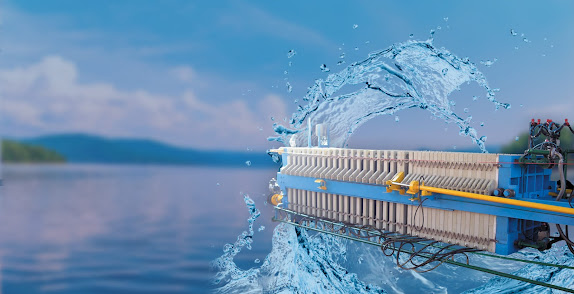A filter press is one of the most primitive and dependable pieces of dewatering equipment. It is used to treat wastewater in a variety of industries and applications. A filter press separates solids from liquids while also removing impurities and suspended solids from industrial wastewater. This enables plant managers to easily handle and dispose of waste while reintroducing clean water into their systems.
What is a Filter Press?
Filter presses are particularly useful because the leftover solids are less expensive and easier to transport than the entire slurry. Plant managers can exhaust the clean water returned by filter presses to their local municipalities, and watersheds, or use the water in their own closed-loop systems, resulting in highly efficient processes.
Diagram of a Micronics filter press a filter press is a piece of liquid/solid separation equipment. each filter press is essentially designed based on the volume and type of slurry that needs to be dewatered. Micronics, Inc. is a trusted liquid/solid separation expert, offering a wide range of filter press types and abilities to meet specific application needs for trouble-free, cost-effective dewatering.
Sidebar automatic, manual overhead, automatic dual overhead beam, stainless steel clad, explosion-proof filter presses, vacuum filter presses, and hand filter presses are among the configurations available.
A filter press is a type of dewatering machine used to separate liquids and solids. Filter presses accomplish this by separating liquids and solids using high-pressure filtration as slurry is pumped into the filter press. This enables the filter press to produce a non-liquid material known as a "cake." This cake makes material transportation and disposal more cost-effective and efficient.
The filter press can be used to efficiently separate liquids and solids in a variety of industries. But how can a filter press work, and what are the benefits and drawbacks to using it?
The filter press design is primarily determined by the dewatering volume and type of slurry. We specialize in liquid and solid separation and have a wide range of filter press types and capacities to meet specific application needs for trouble-free, cost-effective dewatering.
How does it Work?
Filter presses operate on the principle of slurry being pumped into the machine in such a way that solids are distributed evenly during the filling cycle.
Filter presses are required to retain a specific volume of material and separate liquids and solids via pressure filtration. For dewatering, a slurry is pushed into the filter press and subjected to high pressure. Solids begin to form within the chambers as the pressure rises. When the chambers are completely filled, they form a cake, and the process is finished.
This type of processing is commonly used on sludge where the solids are disposed of as hazardous waste and through high-temperature incineration or secure landfill and maximum volume reduction is desired. The filter press has a wide range of applications in both industrial and municipal configurations.
Filter presses are a pressure filtration method, so as the filter press feed pump increases pressure, solids accumulate within the chambers until they are completely full of solids, forming the cake. The cycle is complete when the chambers are full, and the filter cakes are ready to be released.
Fast action automatic plate shifters are used in many higher capacity filter presses, which reduces cycle time. Some filter presses are specifically designed for a fully automatic, 24-hour process in harsh environments such as mines or chemical manufacturing plants.
During the fill cycle, the slurry pumps into the filter press and transmits itself evenly. Solids accumulate on the filter cloth, forming the filter cake in the plate's void volume. The filtrate, or clean water, exits the filter plates via the ports and releases clean water through the plates' sides.
Filter presses are a type of pressure filtration device. As the filter press feed pump increases pressure, solids accumulate within the chambers until they are completely full.
This is what makes the cake. When the plates are full, the filter cakes are released, and the cycle is complete. Additionally, many higher capacity filter presses utilize fast-action automatic plate shifters, which reduces cycle time.
Filter Press Advantages
- The filter press offers numerous advantages that other dewatering methods do not. These are some examples:
- Fewer parts realise smoother maintenance.
- Captures a significant amount of solids
- In some areas, it is the only machine capable of producing a dry sufficiently cake to meet landfill specifications.
- Large capacity for processing
- Service life is extended
- Energy consumption is minimal.
- A large percentage of conditioning chemicals are used.
- High levels of noise
- Mining
- Steel mills
- Food and beverage manufacturing
- Chemical manufacturing
- Power Generation
- Municipal Plants
- Production of Cement and Asphalt
- Machine design
- Capability for filtration
- Size of the plate and the number of chambers
- Frame
- Filter Plates
- Manifold
- Filter Cloth (Important for optimizing filter press operations.
- Food and beverage manufacturing
- Chemical production
- Exploration
- Production of electricity
- Production of aggregates, asphalt, and cement
- Steel mills
- Municipal power plants

Comments
Post a Comment